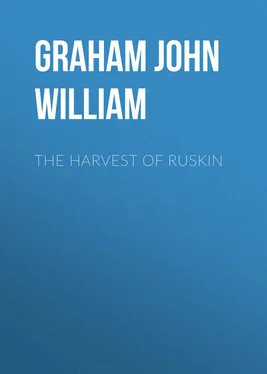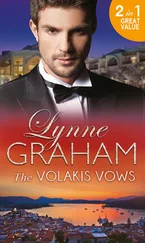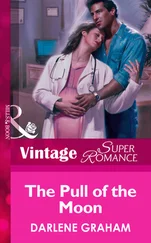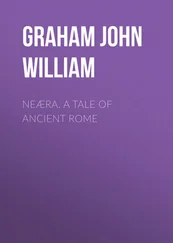John Graham - The Harvest of Ruskin
Здесь есть возможность читать онлайн «John Graham - The Harvest of Ruskin» — ознакомительный отрывок электронной книги совершенно бесплатно, а после прочтения отрывка купить полную версию. В некоторых случаях можно слушать аудио, скачать через торрент в формате fb2 и присутствует краткое содержание. Жанр: literature_19, foreign_antique, foreign_prose, на английском языке. Описание произведения, (предисловие) а так же отзывы посетителей доступны на портале библиотеки ЛибКат.
- Название:The Harvest of Ruskin
- Автор:
- Жанр:
- Год:неизвестен
- ISBN:нет данных
- Рейтинг книги:5 / 5. Голосов: 1
-
Избранное:Добавить в избранное
- Отзывы:
-
Ваша оценка:
- 100
- 1
- 2
- 3
- 4
- 5
The Harvest of Ruskin: краткое содержание, описание и аннотация
Предлагаем к чтению аннотацию, описание, краткое содержание или предисловие (зависит от того, что написал сам автор книги «The Harvest of Ruskin»). Если вы не нашли необходимую информацию о книге — напишите в комментариях, мы постараемся отыскать её.
The Harvest of Ruskin — читать онлайн ознакомительный отрывок
Ниже представлен текст книги, разбитый по страницам. Система сохранения места последней прочитанной страницы, позволяет с удобством читать онлайн бесплатно книгу «The Harvest of Ruskin», без необходимости каждый раз заново искать на чём Вы остановились. Поставьте закладку, и сможете в любой момент перейти на страницу, на которой закончили чтение.
Интервал:
Закладка:
Just before this incident, however, his moral sense was beginning to revolt from certain parts of his creed. He was, he says, invited to a “fashionable séance of Evangelical doctrine, at the Earl of Ducie’s, presided over by Mr. Molyneux, then a divine of celebrity in that sect, who sat with one leg over his other knee, in the attitude always given to Herod at the Massacre of the Innocents in mediæval sculpture, and discoursed in tones of consummate assurance and satisfaction, and to the entire comfort and consent of his Belgravian audience, on the beautiful parable of the Prodigal Son. Which, or how many, of his hearers he meant to describe as having personally lived on husks, and devoured their father’s property, did not of course appear; but that something of the sort was necessary to the completeness of the joy in heaven over them, now in Belgrave Square, at the feet, or one foot, of Mr. Molyneux, could not be questioned. Waiting my time, till the raptures of the converted company had begun to flag a little, I ventured, from a back seat, to enquire of Mr. Molyneux what we were to learn from the example of the other son, not prodigal, who was, his father said, ‘ever with me and all that I have, thine.’ A sudden horror and unanimous feeling of the serpent having somehow got over the wall into their Garden of Eden, fell on the whole company; and some of them, I thought, looked at the candles, as if they expected them to burn blue. After a pause of a minute, gathering himself into an expression of pity and indulgence, withholding latent thunder, Mr. Molyneux explained to me that the home-staying son was merely a picturesque figure introduced to fill the background of the parable agreeably, and contained no instruction or example for the well-disposed scriptural student, but on the contrary, rather, a snare for the unwary, and a temptation to self-righteousness – which was, of all sins, the most offensive to God. Under the fulmination of which answer, I retired from the séance in silence, nor ever attended another of the kind from that day to this.” 7 7 Præterita , III. i. 32-34. Also referred to in Munera Pulveris , App. V.
It was just this lack of feeling for righteousness as such, the idea that you needed first to be a “most sinful sinner” if you wished to become a “most Christian Christian,” and a want of recognition that forgiveness was a spiritual and inward process, which caused the contemptuous references to his early form of doctrine which are scattered thickly throughout Ruskin’s later writings.
The experiences which make epochs in men’s lives are indeed strangely various and unexpected. Three events stand out as the destroyers of his Protestantism and of much of his outward edifice of faith. Their year was 1858. One was the discovery that the Puritan Sabbath of his youth had no Scriptural authority, but based itself, without confessing it, on the Jewish Sabbath Day, by erroneous interpretation. “If they have deceived me in this, they have deceived me in everything,” he said. His faith in his mother’s religious guides was gone. 8 8 Præterita , vol. iii. p. 39.
In 1858 for the first time he broke the Sabbath by drawing some flowers on Sunday. That act, in him, stood for emancipation. 9 9 Id. p. 41.
He had been finding that Catholic Psalters were lovely things, that Catholic peasants in Tuscany led sweet and patient lives, and that “Presbyterian prayers against time by people who never expected to be any the better for them, were unlovely and wrong.” 10 10 Id. p. 48.
The same year he turned in at Turin to hear a Waldensian pastor. This was the second event. “To an audience of about seventeen gray-haired women and a few men, the preacher, a somewhat stunted figure with a cracked voice, put his utmost zeal into a consolatory discourse on the wickedness of the wide world, more especially of the plain of Piedmont and the city of Turin, and on the exclusive favour with God enjoyed by the between nineteen and twenty-four elect members of his congregation, in the streets of Admah and Zeboim.” “Myself neither cheered nor greatly alarmed by this doctrine, I walked back into the condemned city, and up into the gallery where Paul Veronese’s ‘Solomon and the Queen of Sheba’ glowed in full afternoon light.” And in that hour’s meditation his “evangelical beliefs were put away, to be debated of no more.” 11 11 Præterita , vol. iii. pp. 44-6. Fors , Letter LXXVI.
But the solvent influences did not stop there. They seldom fail to proceed. Rebuilding rather than repair is generally necessary to a broken down system of thought. But that which left him in great darkness was an experience which could have so affected no one but Ruskin. This was the third event. It was the discovery at Venice that the best work was done by irreligious painters. He found that “Tintoret only occasionally forgot himself into religion,” and that Titian had no religion at all, and yet had to be given as the standard of perfection in painting. Ruskin concluded, first, and quite truly, that “human work must be done honourably and thoroughly, because we are now men; whether we expect to be angels, or ever were slugs, being practically no matter. That by the work we have done and not by our belief we shall be judged.” 12 12 Fors , Letter LXXVI.
He went on, by generalizing, to a further conclusion in that year, afterwards to be corrected. The conclusion and the correction divide the periods of Ruskin’s life. He concluded that the group of great worldly painters of various nations, Turner, Titian, Velasquez, Sir Joshua, Gainsborough, Tintoret, and Paul Veronese, did more perfect and stronger work than the sacred army of obedient Catholics headed by Cimabue, Giotto and Angelico, who worked under the guidance of a heavenly vision.
This seems a strange reason for losing faith. It can only be understood when we remember that Ruskin regarded art as the expression of the painter’s whole nature, especially the soul of him; and if the endowment from heaven were really potent, it should inspire the artist to do work that is clearly supreme. That it did not do so was Ruskin’s stumbling-block. I will not anticipate the ultimate solution; but only pause to mourn over the many stumbling-blocks which our theories put in our way. Because the lot decided unfairly, Silas Marner, the wronged of heaven, lost his faith. How many have been and are unable to see through pain and poverty to God. How many have bound their faith to the accuracy of a record or the fidelity of a frail fellow-creature.
Of the religious utterances of this first period, which ended in 1858, the second volume of Modern Painters is the most typical. To me, it was the door by which in 1882 I entered into my love of Ruskin the author, as Fors led me to love and reverence the man. The subject is an analysis of Beauty as a various expression of the mind of God. It is published separately; it is not a long book; and it might be read for a second time along with the Author’s notes of 1883. These give us the verdict of age upon the enthusiasm of its own youth, and are vastly entertaining. Even as Tennyson, in his “Locksley Hall Sixty Years After,” puts his quietus upon the ebullitions of the most rhythmic and moving utterance of his youth, so does Ruskin, with mocking self-blame, speak with fatherly candour to the Oxford Graduate of 1845.
To this period, too, belongs his avowedly theological pamphlet, Notes on the Construction of Sheepfolds . It is of 1851, attacks ecclesiastical pretensions on Scriptural grounds, and in spite of its sectarian limitations was considered so sound in its main drift that the author reissued it in his mature period.
He states that all his works up to 1853 are marred by his narrow Protestant dogmatism. Now 1858, as we have seen, was his year of freedom from it, and from much that was more precious. Between 1853 and 1858 came out volumes iii and iv of Modern Painters , the Lectures on Architecture and Painting at Edinburgh, and the lectures at Manchester on the Political Economy of Art . The last marks transition. It is the forerunner of the next period; it shows us how his way of treating Art led him on to Economics. But it is of great interest to study his position in these two volumes of Modern Painters . They are as religious as ever, and as devout; but between Catholic and Protestant, frequently brought into contrast, they hold the scales of judgment. The author casts the lantern of criticism impartially upon both, but his own faith in the great verities still holds. It is plain, however, that conduct was rising to the chief place in his mind. The Sermon on the Mount was becoming, what it ever afterwards remained to him, the central teaching of the Christian faith.
Читать дальшеИнтервал:
Закладка:
Похожие книги на «The Harvest of Ruskin»
Представляем Вашему вниманию похожие книги на «The Harvest of Ruskin» списком для выбора. Мы отобрали схожую по названию и смыслу литературу в надежде предоставить читателям больше вариантов отыскать новые, интересные, ещё непрочитанные произведения.
Обсуждение, отзывы о книге «The Harvest of Ruskin» и просто собственные мнения читателей. Оставьте ваши комментарии, напишите, что Вы думаете о произведении, его смысле или главных героях. Укажите что конкретно понравилось, а что нет, и почему Вы так считаете.












